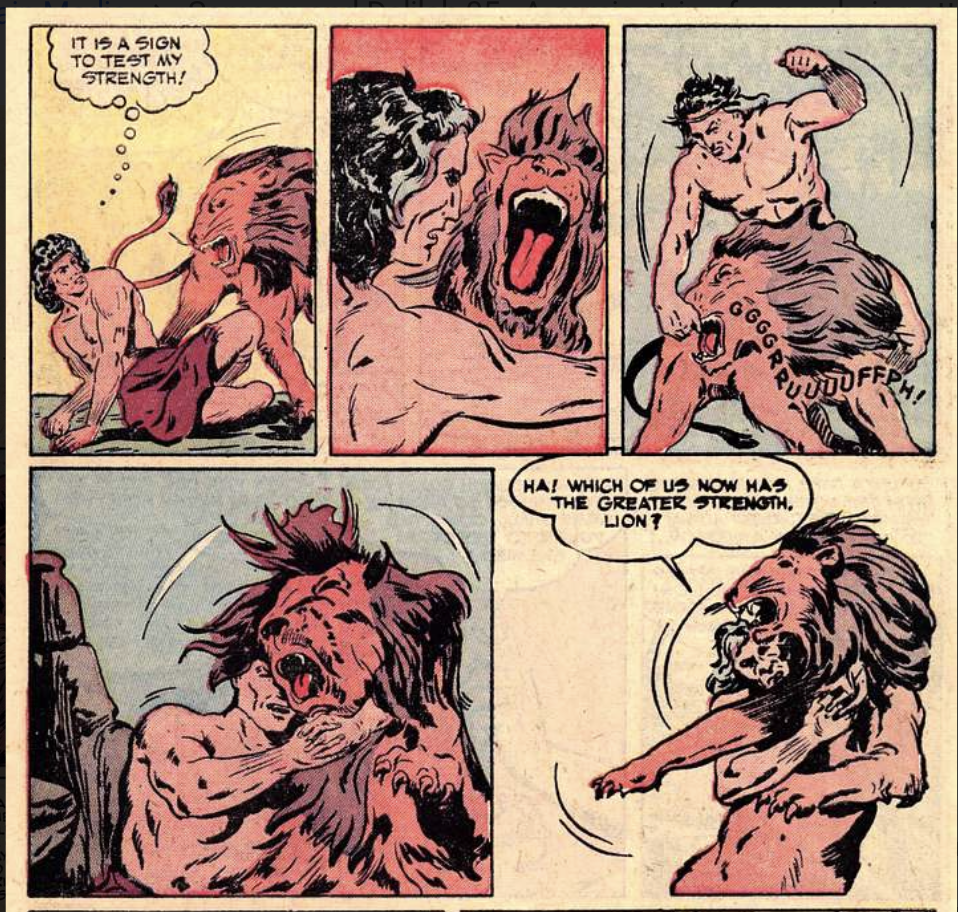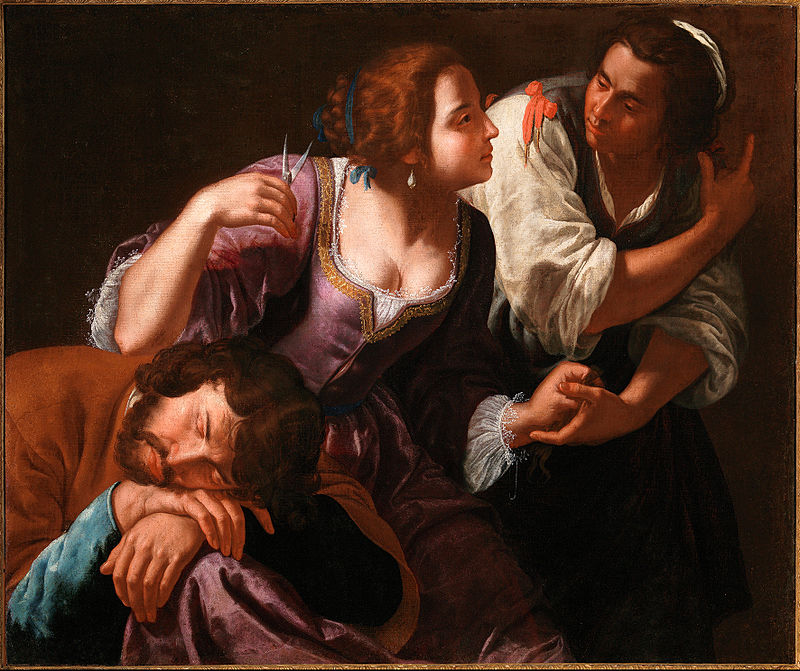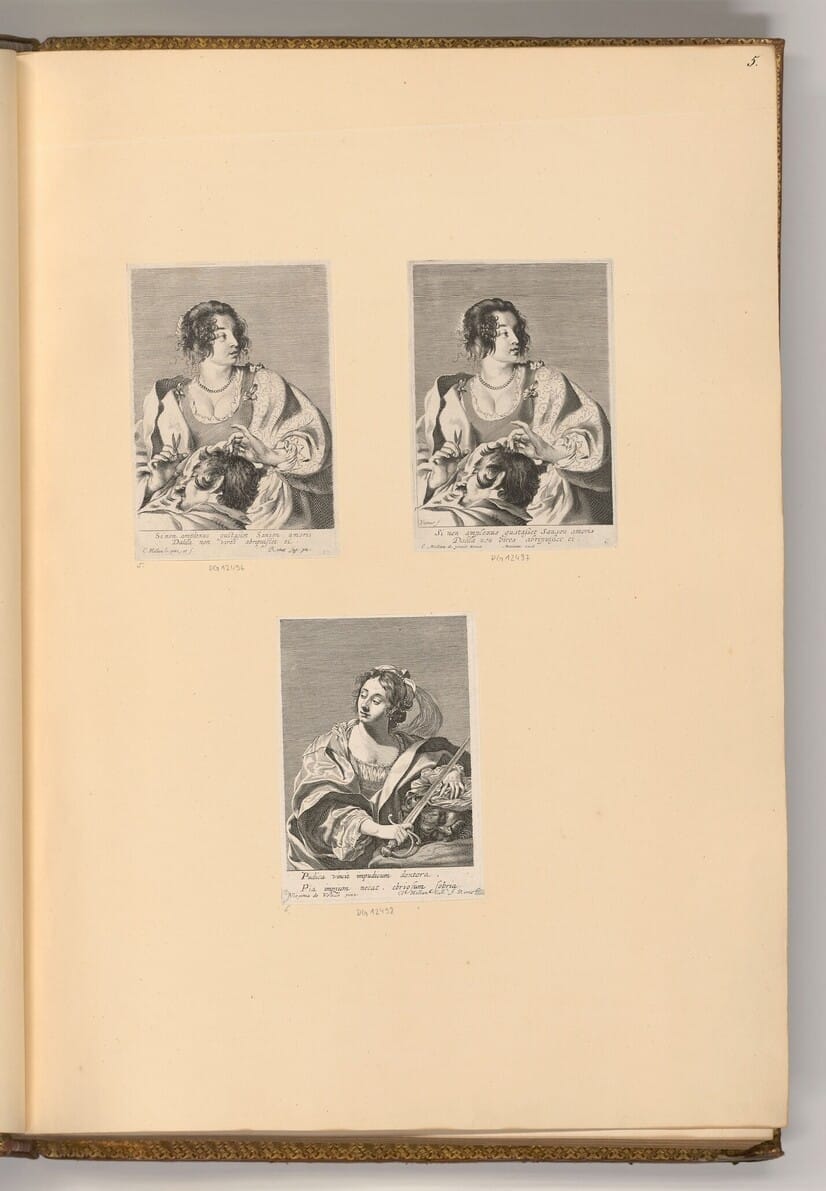A Defense of Delilah
Let's take a closer look at things from her perspective, shall we?

This is Life as a Sacred Text 🌱, an everybody-celebrating, justice-centered voyage into ancient stories that can illuminate our own lives. It‘s run on a nonprofit, so it’s 100% NAZI FREE. More about the project here, and to subscribe, go here:
Last week, we looked at the nazirite, someone who could take a vow to get something of a spiritual time out. As we discussed, Samson is one of the dudes who was dedicated as a nazir from birth.
His story (starting in the Book of Judges 13) was too fascinating to just pass by, so I thought we'd take a moment for it, as long as we're at the Nazirite Waystation.
I want to look at this story through two lenses: Both reading it in a way that might feel familiar– and in a way that may be a bit less so.
Holding the both/and.
Expanding our ability to encounter this text, and our own empathetic imaginations the process.
So I'll start by telling this story in kind of a linear way, and then I'll put the thing down, flip it and reverse it, as the Psalmist sang.
As mentioned last week, Samson's mom got the news that, despite years of infertility, (love a classic biblical trope) she was going to conceive and bear a child. But not just any kid! She needed to stay away from wine or other booze while pregnant, and
"let no razor touch his head, for the boy is to be a nazirite to God from the womb on. He shall be the first to deliver Israel from the Philistines.” (Judges 13:4)
Long hair, save us from the Philistines, don't care. Got it.
Some time passes, and then we meet Teenage Samson:
While in Timnah, [Samson] noticed a certain young Philistine woman. On his return, he told his father and mother, “I noticed one of the Philistine women in Timnah; please get her for me as a wife.” His father and mother said to him, “Is there no one among the daughters of your own kindred and among all our people, that you must go and take a wife from the uncircumcised Philistines?” But Samson answered his father, “Get me that one, for she is the one that pleases me.” (Judges 14:1-3)
"Can't you just find a nice Jewish girl??"
"NOooOoO MOMMM! DADD!! I LIKE HERRR!"
(Because obviously teens ca. 1050 BCE talked back to their parents exactly like 4th gen white Ashkenazi American kids do).
His father and mother did not realize that his request was from God, who was seeking a pretext against the Philistines, for the Philistines were ruling over Israel at that time. So Samson and his father and mother went down to Timnah. (Judges 14:5)
Samson's parents: (labored sigh "We want you to be happy, Shimmy. Should we see if there are resources at 18doors.org?")
When he came to the vineyards of Timnah [for the first time], a full-grown lion came roaring at him. The spirit of God gripped him, and he tore it apart with his bare hands as one might tear apart a goat; but he did not tell his father and mother what he had done. (Judges 14:5-6)
The kid rips apart a whole dang lion, but sheepishly hides this fact like he'd thrown a baseball through the neighbor's window.

Anyway. A year later, this still-clearly-very-mature Samson is on Philistine turf with his unnamed bride, and decides to goad the Philistine wedding party into a bet– if they can solve a riddle, he owes them big cash (30 linen tunics and 30 sets of clothing!) And if they can't, they owe him the same.
This sounds great to the Philistine guests, until he tells them the riddle– which is beyond difficult, since it's effectively Samson's private joke with himself, nothing others could ever deduce. The guests, furious given the stakes, go to Samson's new bride and threaten her family unless she worms the solution out of him. When they answer Samson correctly, he knows that they cheated and that his new bride betrayed him, and he's not happy.
The spirit of God gripped him. He went down to [the Philistine city of] Ashkelon and killed thirty of its men. He stripped them and gave the sets of clothing to those who had answered the riddle. And he left in a rage for his father’s house. (Judges 14:19)
- Dude with superhuman strength, but not superhuman maturity or anger management skills: ✅
- Dude whose Philistine father-in-law, in the wake of this whole mess, remarries Samson's wife off to someone else: ✅ ✅
- Dude with new personal vendetta against the Philistines: ✅ ✅ ✅
So he goes and burns a bunch of the Philistines' grain. And what do they do? Kill his (ex?)wife.
So what does he do? Kills a thousand of their men (with one donkey jawbone, natch.) And then leads the Israelites in various campaigns against the Philistines for 20 years.
After that, he fell in love with a woman in the Wadi Sorek, named Delilah. (Judges 16:4)

Hey, there, Delilah.
Let's pause to check on how she's portrayed in our culture:
The Oxford English Dictionary:

Wiktionary:

... and they go on. Some use significantly less flattering language for women than that. None of this will likely surprise you, I imagine. Betrayal and, uh, loose morals seem to be the two running themes.
She's, you know, one of them women into "recreational sex."

It's time for a defense of Delilah.
What do we know about Delilah?
We know that she's Philistine.
We know that Samson sees Delilah. HE falls in love with HER.
Let's consider her perspective:
- We don't have any indication whatsoever that she reciprocated Samson's interest. (And so often in the ancient world, women were claimed, taken. How much room did she have to refuse? How much did she fear this massive man of unusual strength, and his army?)
- She likely knows that this guy has a track record of anger issues.
- She probably knows that this guy's last relationship didn't turn out so great for the woman involved.
- She knows that this guy had just spent the last twenty years murdering her people. A lot of them.
Would you find any of this... hot?
And her guys show up in the verse right after Samson falls in love, offering her a lot of money:
The lords of the Philistines went up to her and said, “Coax him and find out what makes him so strong, and how we can overpower him, tie him up, and make him helpless; and we’ll each give you eleven hundred shekels of silver.” (Judges 16:5)
Five Philistine lords, one per major city (Gaza, Ashkelon, Gath, Ekron, and Ashdod.) So that's 5,500 shekels of silver total– an astronomical sum.
Think about women's options in most places throughout history: Most of the time, they didn't have money, or access to it. They had to be under the protection of a man. And they didn't usually have a lot of choice about which one.
Here, though?
'Be the hero who takes down the guy who's been killing our people– and, in the process, get an independence and safety you could otherwise never dream of?'
From Delilah's perspective, there's no ethical dilemma. None.
Delilah (mezzo-soprano J'Nai Bridges) courts Samson (tenor Yonghoon Lee) in order to discover the secret of his strength. Seattle Opera, 2023.
OK, but she's, like, super-duper manipulative, right?
... right??
Verse 6, the one immediately following the two we just read:
So Delilah said to Samson, “Tell me, what makes you so strong? And how could you be tied up and made helpless?” (Judges 16:6)
... Oh.
So we have a woman who:
1) Never said yes to this guy in any clear way
2) Is dealing with a man who she has every right to regard as a threat both personally and to her people
3) Has been offered the chance by her own people to not only save them from their biggest threat, but to gain a heretofore unthinkable freedom
4) Is, actually, a totally straight shooter throughout the entire narrative.
Because, as people who know this tale well can attest, there are a few back and forths about this– she asks him the secret to his strength. He gives her a few garbage answers ("sure, baby, it's unused ropes, that'd do it,") and, each time, her bros come and test it out. Turns out he lied. So she asks again– the exact same question, worded in the same way.
He is given no fewer than three opportunities to recognize that she's reporting everything he's told her to her people, and literally testing what he tells her out on him in a clear attempt to subjugate him and he's still hanging around! (What that nazarite fetus got in strength, he apparently missed in the brains department.)
On the fourth round of, "No really, tell me tell me how to sap your strength and defeat you," that doofus Samson actually tells her and, go figure, she shears his nazarite locks, exactly as advertised. (1)


Well, but, like, Delilah used her sexuality! So gross!
Yes, since, like every other woman for most of history, that was literally the one card she had to play.
We laud biblical women who do exactly the same things that Delilah does to save their own people when when they were at risk, except the heroines we hold up are often, well, a lot more... manipulative/ deceptive/ mercenary/ crafty/strategic /tactical* about it in order to get the job done:
*Gosh, don't things sound different when you've decided for whom you're rooting, and to what gender you're attributing them?
- Esther, who got to the monarchy via beauty pageant/trafficking/sex contest, invites Ahasverosh to party after party (with, presumably, the kind of party favors a king would expect) before revealing that her people are in danger and she needs his help.
- Judith dresses up pretty, lies to Holofernes' men, engages in doublespeak, parades around for days looking innocent, knocks him out with wine and then BAM! with the sword.
- Yael invites Sisera into her, uh, tent, knocks him out with, uh, milk, and then BAM! with the tent peg and mallet. A clear violation of the laws of hospitality, but all's fair in... &etc.
And then there are the women who use their sexuality to save themselves and/or their families, like–
- Tamar, who is left with very few options after her father-in-law Judah leaves her trapped in levirate marriage obligations, so she dresses up as a prostitute to get pregnant by him, and her actions merit ancestry of both King David and the Messiah.
- and Sarah, who pretends to be her husband Abraham's brother (not clearly so consensually, but OK) in order to warm Pharaoh's bed in Egypt and keep Abe safe.
(...and the list goes on.)

The only difference between Delilah's actions and those of the women we laud is that she wasn't playing for the team the Bible roots for.
Literally the only difference. Swap the identities of the Philistines and the Israelites in the rest of the Samson narrative and the Oxford English Dictionary would be singing a very different tune.
(And lest you try to tell me that the big difference is that the Israelites are always playing defensive ball, unseating oppressors, we all know that's not the Biblical narrative.)

So what does it mean if we acknowledge that Delilah's actions aren't inherently bad or wrong?
It pushes us to expand that empathetic imagination, dangit. (Sorry.)
To remember that as comfortable as we may be in the narrative of ourselves as the "good guys," always, there are always other people, somewhere else, who have a different experience simply by dint of them being, you know, the human beings who happened to land somewhere else and have a different experience.
If we can stop for a minute and remember that there's no Torah in demonizing people for doing exactly what you would have done in the exact same situation had the roles been reversed.
It's a reminder that, often enough, the roles have been reversed.
Maybe not in this particular situation. Maybe not in this confrontation. Maybe not in this moment in history.
But just as we are all victims of harm, we're also all bystanders of harm, and all perpetrators of harm.
And when we're able to see ourselves in others, it helps to collapse those us/them binaries a bit. Make room for something else to happen. Some other outcome. Some different future.
Yes, this is something of a subtweet, as we used to say in the olden days. (2)
Do I know for sure how I'd rewrite the Samson story?
Well, not entirely. Probably I wouldn't recommend that the kid start out adulthood by trying to trick his own wedding guests. There's that first moment where "us/them" began in earnest. Perhaps his love for his Philistine wife could have helped him pave a different way of liberating the Israelites– one that came out of connection and building bridges instead of antagonism, destroying crops, the beginning of an ongoing cycle of destruction that did great harm to both sides. We'll never know.
But we do know that this path brought so much suffering and pain to all involved.
Because, of course, after his hair gets cut by Delilah, his power is, in fact, sapped. The Philistines blind, bind and enslave him, and a little time passes. At some point, everyone gathers at Philistine Party Central for a sacrifice, and Samson is brought out and put between the pillars of the place.
Turns out his hair had started growing back a bit and he had gotten stronger– strong enough to push at those pillars and topple the place, taking himself down with it– kind of like this, below, though I'm guessing that in the actual Ancient Near East, people looked a lot less white generally, there was a lot less bronzer sweating down Samson's back, the costuming and set may have been a little less kitschy (though we'll give props to the people doing what they could with 1949 pillar-collapsing technology): (3)
@vintageamours Reply to @reddifreddy Samson and Delilah 💙💙 #fyp #vintage
♬ original sound - zaf
And that, in the end, is where this tale ends– this "chosen one" leads with anger and vengeance, and dies together with the "other side."
Including the woman who did what she believed needed to be done to save her people and herself.
Maybe this story could have gone a different way. But it didn't.
But we can still take its lessons to change what happens now.
🌲🌳🌲🌳🌲🌳🌲🌳🌲🌳🌲🌳🌲🌳🌲🌳🌲🌳🌲🌳
Like this? Get more of it in your inbox every week. 🌱
For free every Monday—sign up at the ‘Subscribe now’ button just below.
And if you become a paid subscriber, that's how you can get tools for deeper transformation, a community for doing the work, and support the labor that makes these Monday essays happen.
And as always, if you want in to the Thursday space but paying isn't for you now, just email support@lifeisasacredtext.com and we'll hook you up.
And if you’d like to underwrite one of these donated subscriptions, you can do so by signing up at one of the higher subscription points.
And if it resonated with you, please share this post.
Sending a big pile of blessings and goodness your way. 💕
🌲🌳🌲🌳🌲🌳🌲🌳🌲🌳🌲🌳🌲🌳🌲🌳🌲🌳🌲🌳🌲🌳🌲🌳🌲🌳🌲🌳
🌲🌳🌲🌳🌲🌳🌲🌳🌲🌳🌲🌳🌲🌳🌲🌳🌲🌳🌲🌳🌲🌳🌲🌳🌲🌳🌲🌳
FOOTNOTES
[1] She shears his locks/braids
[2] Empathy, whatta concept / subtweet
[3] Hedy Lamarr!
The Hebrew here is "braid," from the word from "to pass through," and invites a lot of speculation about what this braided 'do could have looked like. Samson is sometimes portrayed these days as having dreadlocks, since regardless of how you interpret the hairstyle, we know there were only seven of the... somethings...that she cuts off, and there's perhaps just enough ambiguity in the translation-- locks/locs of hair, braids of hair, we don't know--that people play, there. (My nerdy suspicion is that it's "braids," as indicated above.) For many reasons--central among them his tenacious resistance even after capture and enslavement by the Philistines--Samson became something of an icon in Black American literature, as a recent-ish book by Professors Nyasha Junior and Jeremy Schipper explores. ↩︎
I wrote most of this piece before the most recent horrors in Gaza, and there's so much that I want to say that would get this whole thing wildly off track and I'm aiming for some vague measure of coherence, here. Anyway, I put some other thoughts on on social media. ↩︎
Yes, this is a clip from Samson and Delilah, 1949, starring the Jew-ish Philistine Hedy Lamarr and the Italian-American Israelite Victor Mature as Samson. Fun fact about Hedy Lamarr: At the beginning of WWII, She co-invented a radio-controlled torpedo for Allied forces; she in particular innovated the concept of "frequency-hopping," transmitting a signal over different frequencies, to keep Axis powers from jamming the system. It became a core component for wireless data systems. Not bad for a treacherous woman of loose morals, eh? ↩︎




